The trail left by the largest cocaine haul in Spanish history
An email reveals how drug traffickers maneuvered to avoid being linked to 13 tons seized in Algeciras, which led investigators to alleged drug lord Ignacio Torán and a police chief arrested with millions of euros stashed in his house
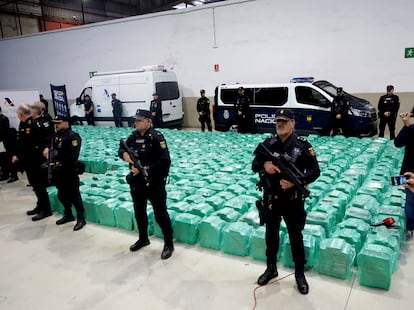
October 17, 2024. An angry businesswoman sends an email to Spanish Customs. Her name is Vilma Janet Águila, and she is the owner of Abadix Fruits, a company based in Alicante supposedly specializing in importing fruit from South America. “How can it be that on average containers spend 2-4 weeks at the port after arrival. We’re talking about perishable fruit (NOT NAILS OR SCREWS). When the fruit gets to our clients, over ripe, they don’t pay us what was agreed upon, because the quality doesn’t correspond to what was negotiated,” she writes in the email, in which she goes out of her way to appear indignant and announces that she is giving up on collecting the cargo of container TCLU1210545, which had arrived in Algeciras a few days earlier: “WE CAN’T TAKE THIS SITUATION ANYMORE!” she complains in capital letters in the text, co-signed by her partner, José Miguel Berenguer.
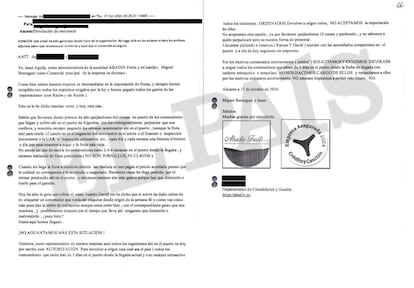
In reality, according to Spain’s National Police, the complainants cared little about the bananas in that container. According to investigators, when the couple sent that email, their main objective was to try to disassociate themselves from the other merchandise hidden among the fruit, since they already knew that the authorities had found it and were monitoring it, waiting for someone to come and collect it: 13 tons of cocaine, the largest haul of the drug seized in the history of Spain. “It’s starting to get boring,” commented one officer during the bale count. At the time, the two had already guessed what was coming their way, as had their supposed boss.
The trail of this stash closes the circle of one of the most high-profile anti-drug operations in Spain in recent years. Investigators have put together many of the pieces of the puzzle, leading from the owners of Abadix Fruits to the Spaniard Ignacio Torán, who has been accused of drug trafficking since the 1990s and whom investigators now place at the top (at least in Spain) of a criminal network dedicated to importing cocaine from South America. Torán also allegedly employed Óscar Sánchez, the head of the National Police’s Economic and Financial Crimes Unit (UDEF), who was arrested last November with nearly €20 million ($22 million) stashed in his office and home (much of which was hidden inside walls).
The Algeciras shipment, whose market value could exceed €700 million ($772 miilion), highlights the roles each defendant played and the vast sums of money they handled. The Ecuadorian company Quality-Ecuatoriana SA sent the container carrying the drugs. It was supposed to be received by Abadix Fruits, a front company headed by Vilma Janet Águila and José Miguel Berenguer, who worked under the orders of Torán, who was actually responsible for the drug shipment, according to police reports. The network also had the support of Óscar Sánchez, who entered key terms into police databases that allowed him to find out if other units were investigating any of his co-conspirators — among many others, he had registered the terms “Abadix” and “Berenguer” in the system. What’s more, Internal Affairs maintains that, after the container containing 13,000 kilos of cocaine was intercepted in the city of Cádiz, Sánchez tipped off the gang, which facilitated the escape of Águila and Berenguer.
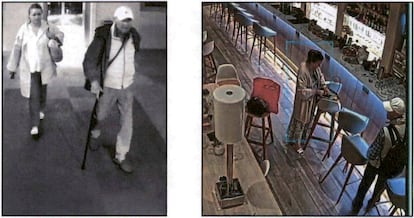
In fact, the investigation reveals the fundamental role played by the chief inspector, who learned of the container’s seizure at 4 p.m., just minutes after it was opened. This is evidenced by two videos of the intercepted merchandise found on his cell phone. At that moment, days of turmoil began for the police officer, who for the first time since his alleged collaboration with Torán began in 2019, saw something spiraling out of his control. Shortly before 6 p.m., one of his subordinates called him. “There’s a lot of cocaine coming out,” his deputy inspector said.
The method Sánchez used to protect members of the organization consisted of entering names, phone numbers, and container numbers into police databases. If another investigative unit also entered them into the system, the chief inspector would receive an alert and could inform his partners. Sánchez had registered the 13-ton container on October 7, a week before it was opened.
In conversation with his sub-inspectors, he was particularly interested in whether the one opened was the one destined for Abadix Fruits in Alicante. Both his subordinate and his superior mentioned several times that they were unaware that this container was going to be inspected, since the initiative to analyze the cargo had come from Customs Surveillance. For this reason, it had escaped Sánchez’s control.
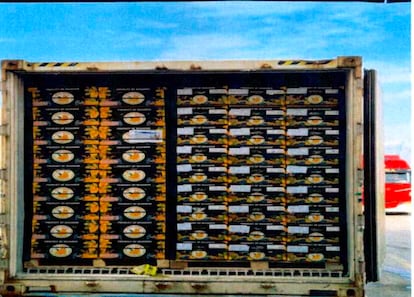
During this flurry of calls, Sánchez also spoke with his superior at the Madrid Provincial Brigade. The latter informed him that he had spoken with the Central Narcotics Brigade and that they, along with Customs, had taken charge of the inspection and controlled delivery of the merchandise. Sánchez was outraged because his colleagues at the Central Narcotics Brigade hadn’t entered the container number into the databases and, therefore, he hadn’t been aware of the coincidence. This was his mechanism for warning his co-conspirators if they were going to be arrested.
Sánchez’s wrath continued the next day, when he spoke again with his superintendent about his colleagues at the Central Brigade: “They’ve interfered in a very dirty way.”
Sánchez’s two cell phones were a source of back-and-forth conversation. Two days after the container was examined, he informed Torán that the shipment had been discovered because there had been a “tip-off” from Ecuador the same day. Torán replied that it could have been “the three letters,” referring to the DEA, and practically demanded proof from Sánchez that the leak had come from Ecuador.
The rise of cocaine
The investigation into container TCLU1210545, initially filed in an Algeciras court and to which EL PAÍS had access, also sheds more light on a part of the shadowy drug trade that has authorities playing catch up. Three factors converge in these investigations that have set off alarm bells in recent years: the rise of cocaine trafficking (the Public Prosecutor’s Office has warned that seizures have multiplied and that Spain ranks third in Europe in terms of the largest amount of cocaine entering); the role of ports as the main entry route for this narcotic; and the involvement of corrupt police officers, for sale to the highest bidder.
To make matters worse, the route used is not surprising. In its latest report, the Prosecutor’s Office highlighted the “importance” of the port of Guayaquil as a “cocaine exit point” for Europe and, at the same time, focused on the Cádiz facility as one of the main entry points for the illicit merchandise, along with the ports of Valencia and Barcelona.
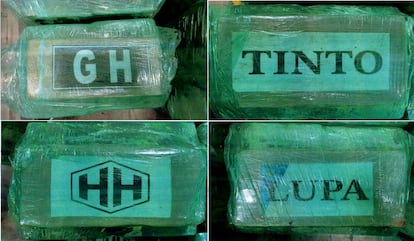
Specifically, members of the gang led by Torán had previously used the port of Algeciras for their schemes. In several reports, agents emphasize that another container with 1.6 tons of cocaine was intercepted there in May 2021, traveling hidden in a container carrying pineapples in the name of the company Trapani Export. José Luis López Rodrigo, who works “under Torán’s orders,” was identified as the person behind this partnership, and that shipment was also linked to Alejandro Salgado, alias “El Tigre,” a Spanish drug trafficker based in Dubai. Investigators were unable to capture López Rodrigo at the time because, they maintain, Sánchez was already operating under the organization’s tutelage and tipped him off, allowing him to escape. López Rodrigo remained wanted for a year, until he turned himself in to the police in 2022 and was released. On November 8, 2024, he was arrested and finally remanded in prison. This situation left Trapani Export burned, and Abadix Fruits replaced it “as the main vehicle for the organization led by Torán” to introduce “cocaine shipments into Spain,” according to a resolution signed by Judge Francisco de Jorge, head of the Central Investigation Court 1 of the Spanish High Court, which is investigating Torán’s criminal group and its ties to the head of the UDEF. The members of the plot had set up Abadix Fruits in 2018. Vilma Janet Águila was listed as its main partner, with 98% of the shares. Her sister Flor Celina owned 2%. José Miguel Berenguer, Águila’s husband, was the “main salesperson.”
The couple were “normal people,” as Torán himself described them, having allegedly recruited them in 2018. During the police surveillance carried out on them in 2024, they were barely seen leaving their villa in El Campello (Alicante), except to take their daughter to school. Drug trafficking organizations use fruit and vegetable companies to mask their illegal activities because they have established shipping routes and go more or less unnoticed at customs due to their prior experience, while tropical fruits are the most commonly imported product from Latin America in Spain. In the intercepted conversations, Berenguer appears to be a dutiful employee to his boss, Torán. “At your disposal,” “Whatever you say, don’t worry,” the fake businessman is heard telling the network’s leader in a 2020 conversation.
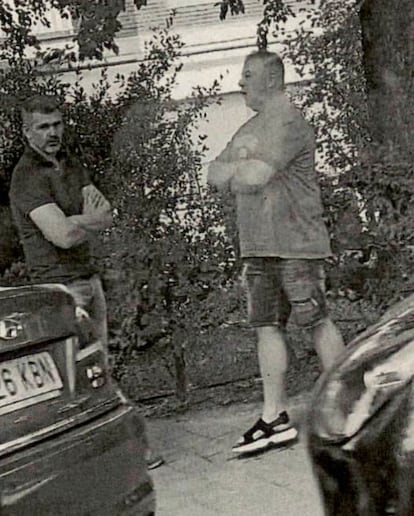
In the days following the seizure of the cocaine, the organization was paranoid because they had just lost a lot of money on their big heist, which they had been planning for months. Berenguer gave Torán his daughter’s phone number to “look after her,” in anticipation of arrest or flight. “He’s too imaginative, it’s not like he’s going to Guantánamo,” the chief inspector downplayed. However, Torán expressed concern about Berenguer’s possible arrest: “There’s nothing we can do now. What a mess. Let’s see if he behaves.” “I’m worried,” Sánchez responded, referring to the possibility that Berenguer might reveal information to the police. October 24 was the day scheduled for the arrests of Berenguer and Águila, but thanks to a tip-off from the organization, they had already fled. When the police arrived at one of their homes, they encountered two of Berenguer’s brothers, who lived nearby. One of them told the officers that he hadn’t spoken to his relative for years.
“I knew the pineapples didn’t earn them that much...” the same brother commented on the couple’s luxurious lifestyle. Berenguer and Águila remained on the run until they turned themselves in to the police in March.
Torán's preventive jail order annulled
Investigating Judge Francisco de Jorge remanded Ignacio Torán in custody following his arrest last November, but the Criminal Chamber recently accepted an appeal seeking to annul the decision. The court believes his rights were violated because the judge failed to provide his lawyer with the "essential elements" of the charges against him as the case was sealed under a secret summary order at the time, preventing him from properly defending himself.
Sign up for our weekly newsletter to get more English-language news coverage from EL PAÍS USA Edition